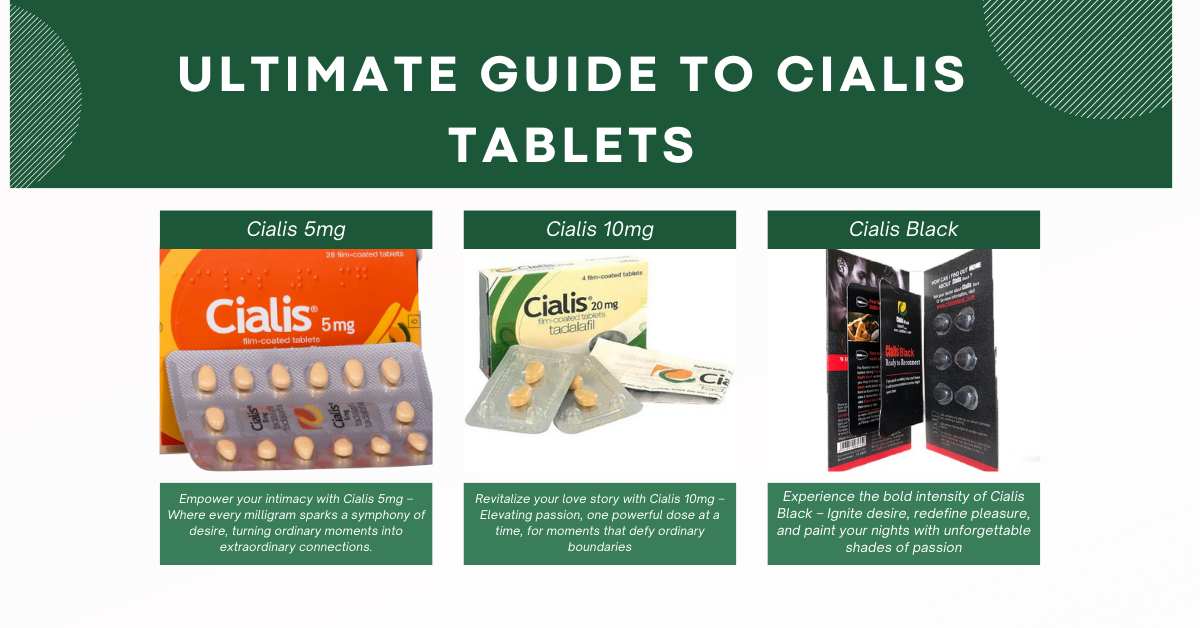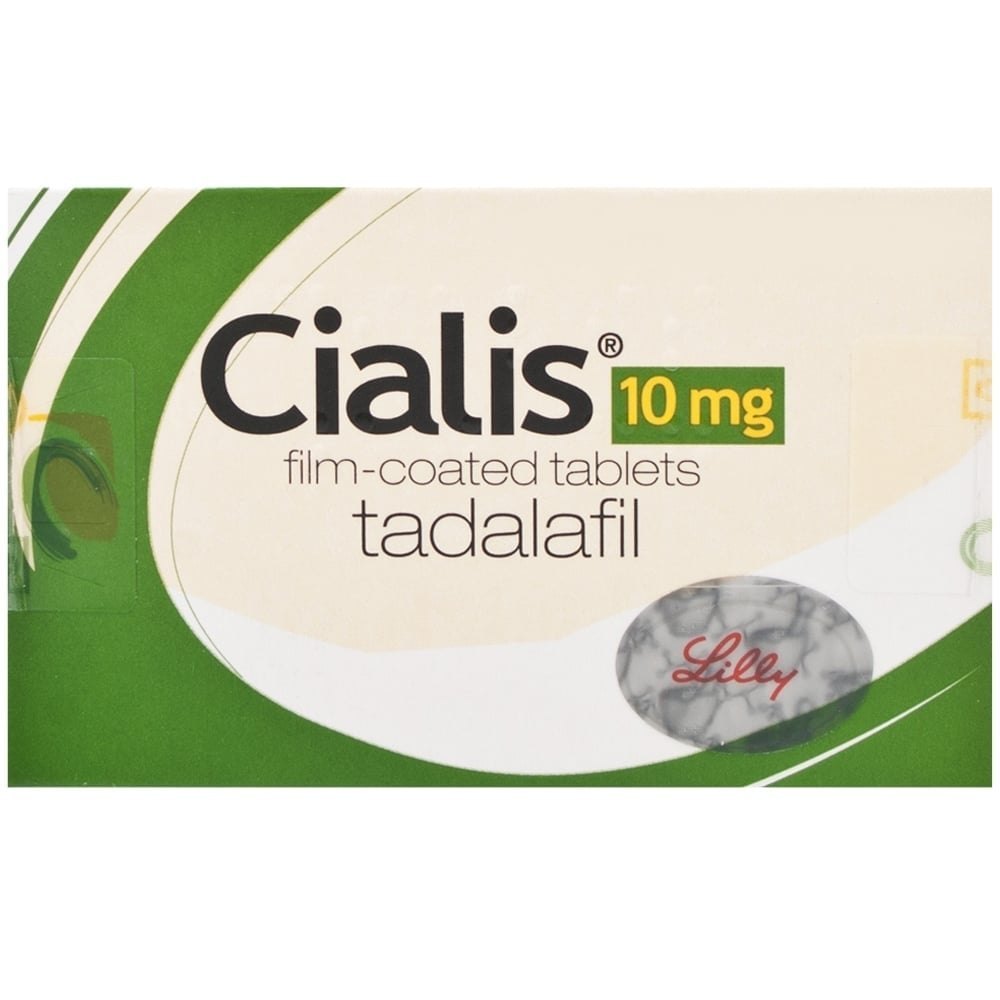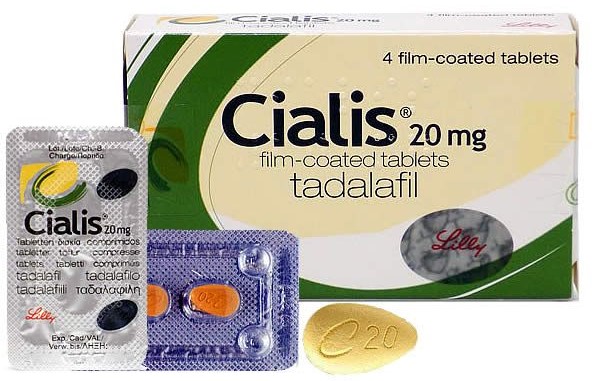

In today’s fast-paced world, it’s not uncommon for individuals to experience certain challenges in the bedroom. Whether it’s due to stress, age, or other factors, many people find themselves seeking solutions to enhance their sexual performance. One such solution is Cialis, a medication that has gained popularity for its ability to treat erectile dysfunction (ED) and improve sexual satisfaction. If you’re curious about Cialis tablets and want to learn more, you’ve come to the right place. In this comprehensive guide, we’ll explore everything you need to know about Cialis, from how it works to the potential side effects and where to buy it. So, let’s dive in and discover the ultimate guide to Cialis tablets!
Cialis, also known by its generic name tadalafil, is a prescription medication commonly used to treat erectile dysfunction and benign prostatic hyperplasia (BPH). It belongs to a class of drugs called phosphodiesterase type 5 (PDE5) inhibitors. PDE5 inhibitors work by increasing blood flow to the penis, allowing for a firm and lasting erection during sexual stimulation. Unlike other similar medications, Cialis has a longer duration of action, earning it the nickname “the weekend pill.” This extended effectiveness gives users the flexibility to engage in sexual activity without the need for precise timing.
Cialis comes in tablet form and is available in various strengths, including 2.5mg, 5mg, 10mg, and 20mg. The dosage prescribed by a healthcare professional will depend on several factors, such as the severity of the individual’s erectile dysfunction and their overall health. It’s important to note that Cialis is not an aphrodisiac and does not increase sexual desire. Sexual stimulation is still necessary for the medication to work effectively.
To understand how Cialis works, it’s essential to grasp the physiology of an erection. When a man is sexually aroused, his body releases nitric oxide (NO), which stimulates the production of cyclic guanosine monophosphate (cGMP). This compound relaxes the smooth muscles in the penis, allowing for increased blood flow and resulting in an erection. However, an enzyme called phosphodiesterase type 5 (PDE5) breaks down cGMP, leading to the loss of an erection.
Cialis works by inhibiting the action of PDE5, thus preventing the breakdown of cGMP. By doing so, it allows for a sustained increase in blood flow to the penis, promoting and maintaining an erection. The extended duration of Cialis’s effect is due to its longer half-life compared to other PDE5 inhibitors. While the effects of other medications may last for a few hours, Cialis can provide up to 36 hours of improved erectile function.
The use of Cialis tablets offers several benefits for individuals experiencing erectile dysfunction. The primary advantage is the ability to achieve and maintain an erection during sexual activity. This can lead to increased sexual satisfaction and improved overall quality of life. Additionally, Cialis’s extended duration of action provides users with greater flexibility and spontaneity when it comes to engaging in sexual intercourse. Unlike some other medications, Cialis does not require precise timing, allowing users to enjoy sexual activity without the pressure of immediate administration.
Furthermore, Cialis has been shown to have a positive impact on the symptoms of benign prostatic hyperplasia (BPH). BPH is a condition characterized by an enlarged prostate gland, which can cause difficulties with urination. Cialis helps relax the smooth muscles in the prostate and bladder, leading to improved urine flow and reduced urinary symptoms. This dual benefit of treating both erectile dysfunction and BPH makes Cialis a versatile medication for many individuals.
The dosage and usage instructions for Cialis tablets should be followed precisely as prescribed by a healthcare professional. The typical starting dose for most individuals is 10mg, taken at least 30 minutes before sexual activity. However, depending on individual response and tolerability, the dose may be adjusted to a maximum of 20mg or reduced to 5mg. It’s important to note that taking more than the recommended dose will not result in a stronger or longer-lasting erection and may increase the risk of side effects.
Cialis tablets should be taken orally with a glass of water, and can be taken with or without food. However, consuming a high-fat meal before taking Cialis may delay its onset of action. It’s essential to avoid exceeding the recommended dosage and to adhere to the prescribed schedule. Cialis is not intended for daily use, so it’s important to allow at least 24 hours between doses.
Cialis comes in various doses, and understanding the distinctions between them is vital for optimal results. The typical doses include 2.5mg, 5mg, 10mg, and 20mg. Your healthcare provider will prescribe a specific dose based on factors such as your overall health, the severity of your erectile dysfunction, and how well your body responds to the medication.
Low doses like Cialis 2.5mg and Cialis 5mg are often prescribed for individuals who plan to use Cialis on a daily basis. This low-dose regimen allows for continuous therapeutic levels of the medication in your system, promoting spontaneity in sexual activity without the need to time your dose precisely.

The Cialis 10mg dose is a common starting point for many individuals. It strikes a balance between effectiveness and minimizing the risk of side effects. It’s important to note that individual responses to the medication may vary, and your healthcare provider might adjust the dose based on your specific needs.

The Cialis 20mg dose is usually prescribed for individuals who don’t achieve the desired results with lower doses. However, it’s crucial to consult with your healthcare provider before opting for a higher dose, as it may increase the likelihood of side effects.

Beyond the standard doses, some individuals may find that the 40mg dose of Cialis is more suitable for addressing their erectile dysfunction. This higher dose is typically prescribed for those who have not achieved the desired results with lower doses or for those with more severe cases of erectile dysfunction.
It’s crucial to note that the 40mg dosage should only be taken under the guidance of a healthcare professional, as it may increase the risk of side effects. Your doctor will consider your overall health and medical history before recommending a higher dose.

Cialis 100mg Tablet is not a standard dosage of the medication. It’s important to clarify that Cialis is typically available in doses up to 20mg. If you come across information or products claiming to offer Cialis in 100mg doses, exercise caution. Such products may be counterfeit or unsafe, and their efficacy and safety cannot be guaranteed.
Always obtain your medication from a reputable source, such as a licensed pharmacy, and follow the prescribed dosage recommended by your healthcare provider.
“Cialis Black Tablet” is not an official term used by the pharmaceutical manufacturer. It’s crucial to be aware that the term “Cialis Black” is often associated with counterfeit or unregulated products claiming to be a more potent version of Cialis. These products may contain undisclosed or harmful ingredients and pose significant risks to your health.
To ensure your safety and the effectiveness of the medication, always obtain Cialis from a trusted and authorized source. Consult your healthcare provider to determine the appropriate dosage for your specific needs and avoid relying on unregulated products with unsubstantiated claims.
Whether you opt for a daily low dose or an as-needed higher dose, timing is crucial. Cialis is known for its long duration of action, providing a window of opportunity for sexual activity that extends up to 36 hours.
Determining the right Cialis dose requires a thorough assessment by a healthcare professional. Factors such as your overall health, existing medical conditions, and other medications you may be taking will influence the appropriate dosage.
It’s essential to clarify that Cialis, or any other phosphodiesterase type 5 (PDE5) inhibitor, does not increase the actual size of a man’s penis. The primary function of Cialis is to enhance blood flow to specific areas, including the genital region. This improved blood flow facilitates the achievement and maintenance of an erection, contributing to improved sexual performance.
While Cialis can enhance the quality of erections, it does not cause permanent physical changes to the size of the penis. Any claims suggesting otherwise may be based on misinformation or misconceptions.
For individuals seeking solutions to concerns about penis size, it’s advisable to consult with healthcare professionals who can provide accurate information and guidance. Communication with a healthcare provider is crucial to understanding realistic expectations and exploring appropriate options.
Cialis is not intended for use by women, and its safety during pregnancy has not been extensively studied. Generally, medications like Cialis are not prescribed to pregnant women unless the potential benefits outweigh the risks and are determined by a healthcare professional.
If there is a possibility of pregnancy or if a woman is already pregnant, it is crucial to inform the healthcare provider. They can assess the individual situation and recommend appropriate alternatives or precautions. As a general precaution, it’s advisable for pregnant women or those trying to conceive to avoid the use of Cialis or any other PDE5 inhibitors unless explicitly directed by a healthcare provider.
Cialis is designed to address erectile dysfunction in men and is not a form of contraception or birth control. It does not prevent pregnancy, and its use does not impact the effectiveness of birth control methods used by women.
For individuals using birth control methods, there is no direct interaction between Cialis and most contraceptive measures. However, it’s crucial for both partners to communicate openly about their medications and healthcare choices. If there are concerns or questions about the potential interactions between Cialis and specific birth control methods, consulting with a healthcare professional is recommended.
Cialis is known for its prolonged duration of action compared to other erectile dysfunction medications. The effects of Cialis can last up to 36 hours, earning it the nickname “the weekend pill.” This extended window of efficacy allows for greater flexibility in the timing of sexual activity. It’s important to note that individual responses may vary, and factors such as age, overall health, and the presence of other medications can influence how long the effects last.
For most individuals, a single dose of Cialis is sufficient for a weekend’s worth of sexual activity. It’s crucial to follow your healthcare provider’s recommendations regarding dosage and frequency to ensure the optimal balance between effectiveness and safety.
The duration of Cialis use varies depending on the underlying reasons for its prescription. For some individuals, Cialis may be prescribed on an as-needed basis, allowing them to take it when they anticipate sexual activity. Alternatively, a daily low-dose regimen (2.5mg or 5mg) might be recommended for those seeking a continuous, low-level concentration of the medication in their system.
In cases where erectile dysfunction is a persistent or chronic condition, long-term use may be necessary. It’s essential to follow your healthcare provider’s advice regarding the duration and frequency of Cialis use. Regular check-ups and open communication with your healthcare provider will help assess the ongoing necessity of the medication and any potential adjustments to the treatment plan.
Cialis is not typically taken on a regular daily schedule unless prescribed as a daily low-dose regimen. For individuals using Cialis on an as-needed basis, missing a dose is not a cause for concern.
If you forget to take Cialis before anticipated sexual activity, you can take it as soon as you remember. However, it’s important not to take more than one dose within a 24-hour period. Missing a dose occasionally is unlikely to have a significant impact, but consistent adherence to your healthcare provider’s recommendations will contribute to the best outcomes.
While moderate alcohol consumption is generally considered acceptable with Cialis, excessive alcohol intake can increase the risk of certain side effects. Both Cialis and alcohol can cause vasodilation (widening of blood vessels), and combining them may lead to a drop in blood pressure. This can result in dizziness, lightheadedness, and an increased risk of fainting.
It’s advisable to limit alcohol intake when using Cialis to avoid potential complications. If you have concerns about combining Cialis with alcohol, it’s best to consult with your healthcare provider for personalized advice based on your individual health and lifestyle.
Several alternatives to Cialis are available for treating erectile dysfunction, each with its own set of advantages and considerations. Some common alternatives include:
Choosing the most suitable option depends on individual preferences, health considerations, and the advice of a healthcare provider.
An overdose of Cialis can lead to an increased risk of adverse effects, including severe hypotension (low blood pressure), dizziness, and fainting. It’s crucial to adhere to the prescribed dosage provided by your healthcare provider and not exceed the recommended limits.
If you suspect an overdose or experience severe side effects, seek immediate medical attention. Emergency medical services can provide appropriate care to address the symptoms of overdose.
Certain medications may interact with Cialis, potentially affecting its effectiveness or increasing the risk of side effects. It’s important to inform your healthcare provider about all the medications you are currently taking, including prescription drugs, over-the-counter medications, and supplements.
Common medications that may interact with Cialis include nitrates (often prescribed for chest pain) and alpha-blockers (used to treat hypertension). Combining Cialis with these drugs can lead to a dangerous drop in blood pressure.
Always consult with your healthcare provider before combining Cialis with any other medications to ensure safety and efficacy. They can provide personalized guidance based on your specific health conditions and medication history.
As with any medication, Cialis tablets may cause side effects in some individuals. Most side effects are mild and temporary, resolving on their own without medical intervention. Common side effects include headache, facial flushing, nasal congestion, indigestion, and muscle aches. These side effects are typically well-tolerated and do not require treatment unless they persist or worsen.
In rare cases, more severe side effects may occur. These can include sudden vision loss or changes in vision, sudden hearing loss, chest pain, and priapism (a prolonged and painful erection lasting more than four hours). If any of these serious side effects occur, it’s important to seek immediate medical attention. Additionally, individuals with certain pre-existing medical conditions or taking specific medications may be at higher risk of experiencing adverse effects. Consulting a healthcare professional before starting Cialis is crucial to ensure its safe use.
While Cialis is generally safe and well-tolerated, it’s important to be aware of certain precautions and contraindications associated with its use. Individuals with a history of cardiovascular disease, liver or kidney impairment, or certain eye conditions should exercise caution when using Cialis. Additionally, individuals taking nitrates, alpha-blockers, or other medications for erectile dysfunction should inform their healthcare provider before starting Cialis, as these combinations can lead to potentially dangerous interactions.
It’s also crucial to avoid recreational drugs such as amyl nitrate or “poppers” while taking Cialis, as these substances can interact with the medication and cause a sudden and severe drop in blood pressure. As with any medication, it’s essential to disclose all current medications, supplements, and medical conditions to a healthcare professional to ensure the safe and effective use of Cialis.
Cialis tablets are available by prescription only, and it’s essential to purchase them from a reputable and licensed pharmacy. A healthcare professional will assess an individual’s suitability for Cialis and provide a prescription if appropriate. Online pharmacies can also be a convenient option for purchasing Cialis; however, caution should be exercised to ensure the authenticity and safety of the medication. It’s important to verify that the online pharmacy requires a prescription and is licensed to dispense medication.
Generic Cialis, also known as tadalafil, is a cost-effective alternative to brand-name Cialis. Generic medications contain the same active ingredient as their brand-name counterparts and undergo rigorous testing to ensure their safety and efficacy. While the overall effectiveness of generic Cialis is comparable to brand-name Cialis, there may be slight variations in formulation and appearance. It’s important to note that generic Cialis is only available in certain countries and may not be approved or accessible in all regions. Consulting a healthcare professional can provide guidance on the availability and suitability of generic Cialis.
Is Cialis a cure for erectile dysfunction?
No, Cialis is not a cure for erectile dysfunction. It is a medication that helps improve erectile function and allows individuals to achieve and maintain an erection during sexual stimulation.
Can Cialis be taken with alcohol?
Moderate alcohol consumption is generally acceptable while taking Cialis. However, excessive alcohol consumption can increase the risk of certain side effects and may reduce the effectiveness of the medication.
Can Cialis be taken by women?
Cialis is specifically intended for use by men and has not been approved for use in women. There are other medications available to treat female sexual dysfunction, and women should consult with their healthcare provider for appropriate options.
Can Cialis be taken with other medications?
Cialis can interact with certain medications, including nitrates, alpha-blockers, and other drugs used for erectile dysfunction. It’s important to disclose all current medications to a healthcare professional before starting Cialis to ensure safe and effective use.
How long does Cialis stay in the body?
Cialis has a long half-life of approximately 17.5 hours, which means it can remain in the body for up to 36 hours. However, the effects of the medication may vary among individuals.
Cialis tablets are a popular and effective treatment option for individuals experiencing erectile dysfunction and benign prostatic hyperplasia. With its extended duration of action and flexibility, Cialis provides users with the ability to engage in sexual activity without the need for precise timing. However, it’s important to use Cialis as prescribed by a healthcare professional and to be aware of potential side effects and precautions. By understanding how Cialis works and following the recommended dosage and usage instructions, individuals can improve their sexual satisfaction and overall quality of life. If you think Cialis may be a suitable option for you, consult with a healthcare professional to determine the best course of treatment and enjoy the benefits that Cialis tablets can provide.

Free Delivery All Over The Pakistan
14 days money back guarantee
Ship All Over The Pakistan
100% Secure Checkout
Cialis in Pakistan is a trusted pharmaceutical solution, renowned for addressing erectile dysfunction with efficacy and reliability.